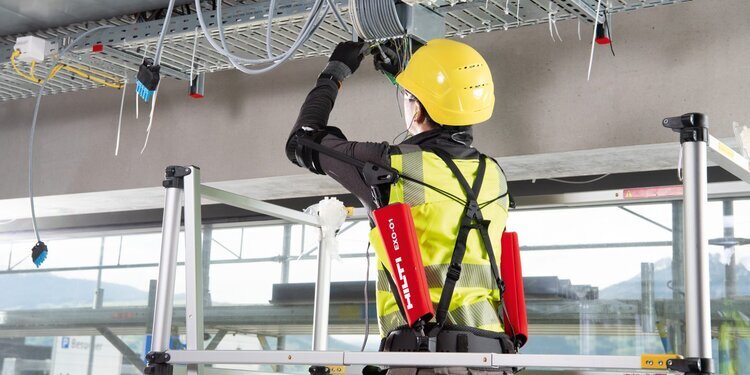
courtesy of CONEXPO-CON/AGG
In the construction world, 3D printing technology has traditionally focused on buildings and other static structures, like this 3D printed bridge in Madrid, Spain. Not anymore, though, as the world’s first 3D printed excavator was officially unveiled to the attendees at last week’s CONEXPO-CON/AGG 2017 in Las Vegas.
The team at Oak Ridge National Laboratory initially announced that the excavator would be at the expo last April. The machine has 3 main 3D printed components: the stick, the cab, and the heat exchanger. The stick which measures 7 feet in length and weighs 400 pounds, is made of steel and took 5 days to print. The cab was made of carbon fiber reinforced ABS plastic and only took 5 hours to print. The heat exchanger was made of 13 pounds of aluminum, but the group has not released how long that component took to print.
Project AME, as the excavator is known, was not just unveiled at the expo to look pretty, either, it was put to work to show it could function just like a normal excavator. Equipment World was at the festivities and put together the quick video below showing the machine in action:
Last summer, Hilti announced that they had developed their first exoskeleton designed for construction tradespeople in a partnership with Ottobuck, a prosthetics, orthotics, and exoskeleton provider. Earlier this month, Hilti officially released the exoskeleton, announced more details, and published its retail price on their website.
Cat Phones is known to make some pretty rugged smartphones, the kind of phone you don’t have to worry about on the jobsite – even without a case. Licensed by the construction equipment giant, Caterpillar, the phones are made by the UK-based Bullitt Group. The company recently announced the release of their new flagship smartphone model, the CAT S62 Pro.
The construction technology world has been no stranger to acquisitions and mergers in recent years, as many larger players are gobbling up startups and other specialty software to quickly grow their offerings and expand their value to their customers. The latest acquisition comes from a somewhat surprising source, however, as Stanley Black & Decker, the power tool and storage company, has acquired Buildup, a task management, punch list, and inspection software company.
Father’s Day 2021 is June 20, so you better get started on gift ideas if you want to impress dad this year. Whether your father is contractor, handyman, or DIYer, we’ve got a lot of great ideas for him this year.
For more more gift ideas, be sure to check out our past Father's Day Gift Guides from 2016, 2017, 2018, and 2019 or our Ultimate Construction Holiday Gift Guides from 2015, 2016, 2017, 2018, 2019, and 2020
Procore, the construction management software company, has been rumored to be interested in filing for an IPO since at least 2019. In the Spring of 2020, Procore ended up delaying its plans to go public after it received $150million in funding and a valuation of around $5 million, citing interest in raising more money amidst an uncertain economy during the heart of the coronavirus pandemic.
It’s that time again to begin Construction Junkie’s annual search for the best construction podcast! Now in our 7th year of the competition, we’re noticing a considerable increase in construction-related podcasts from every sector.
While still new in the construction industries, robots are typically designed to perform a specific task in a highly precise and efficient way, like the rebar tying robot, Tybot or the brick-laying robot Hadrian X. More recently, though, robots are being imagined as platforms for 3rd party companies to develop hardware and accessories to attach to the base robot, like the Boston Dynamics robotic dog, Spot. I recently came across a new robot, called Baubot, which hopes to one day perform tasks using every tool on a typical jobsite.
Autodesk announced the impending release of 3 new products, combining the best of all of their existing products and adding new features, at last year’s virtual Autodesk University. Those products (Build, Takeoff, and BIM Collaborate) are now fully available on a global scale, with Takeoff being the most recent release.
Last summer, we learned that Travelers Insurance believed that using Procore as a project management tool helped contractors reduce risk on their projects so much that they were willing to help pay for them to join the platform. That deal was previously limited to customers in 10 US states, but Travelers and Procore have collaborated to further expand that program.










In the midst of fierce discourse over the bipartisan infrastructure bill lies a unique opportunity for the United States.